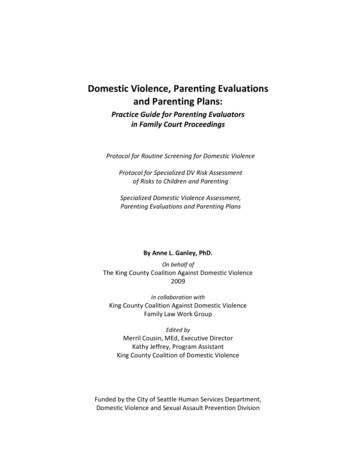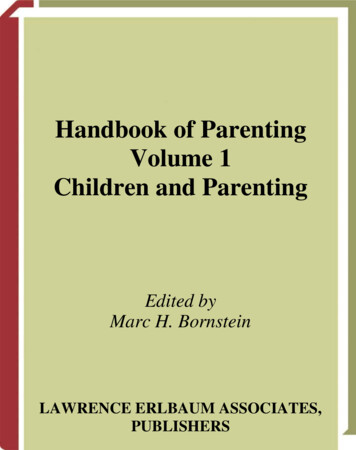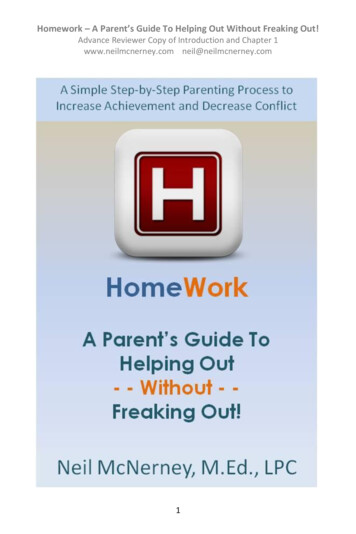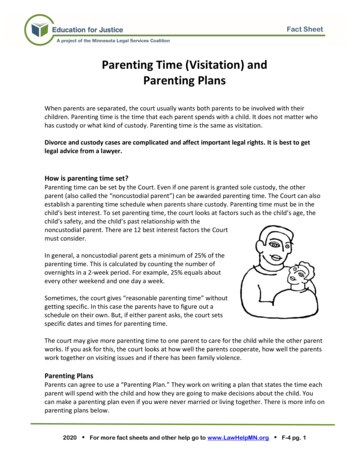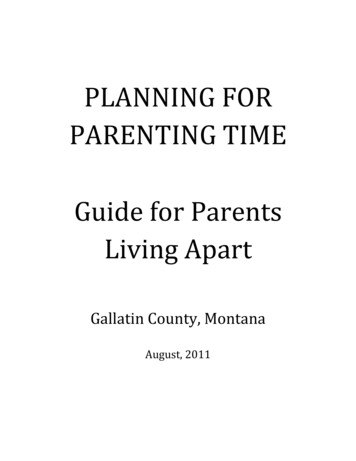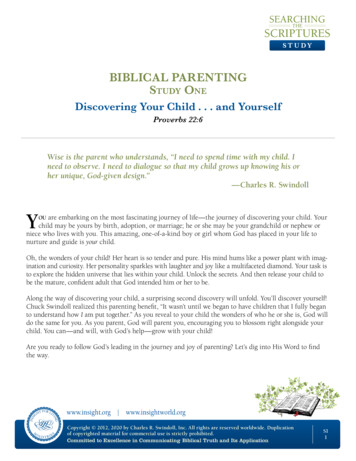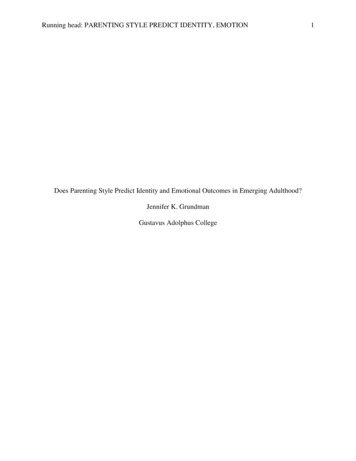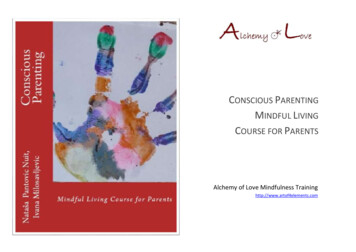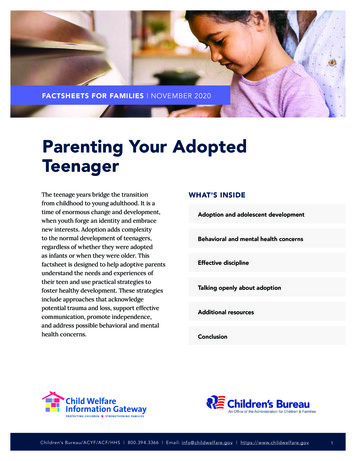
Transcription
FACTSHEETS FOR FAMILIES NOVEMBER 2020Parenting Your AdoptedTeenagerThe teenage years bridge the transitionfrom childhood to young adulthood. It is atime of enormous change and development,when youth forge an identity and embracenew interests. Adoption adds complexityto the normal development of teenagers,regardless of whether they were adoptedas infants or when they were older. Thisfactsheet is designed to help adoptive parentsunderstand the needs and experiences oftheir teen and use practical strategies tofoster healthy development. These strategiesinclude approaches that acknowledgepotential trauma and loss, support effectivecommunication, promote independence,and address possible behavioral and mentalhealth concerns.WHAT'S INSIDEAdoption and adolescent developmentBehavioral and mental health concernsEffective disciplineTalking openly about adoptionAdditional resourcesConclusionChildren’s Bureau/ACYF/ACF/HHS 800.394.3366 Email: info@childwelfare.gov https://www.childwelfare.gov1
ADOPTION AND ADOLESCENTDEVELOPMENTAdolescents experience rapid physical andhormonal growth. As a result, they may beginto look like young adults in their teenageyears. Although some youth may begin toembody adult physical features, their brainsare still developing and they need emotionalsupport and nurturance from caring adults andcontinued parental guidance—whether theyseek it or not.BRAIN DEVELOPMENTThe chemical changes that occur in the teenagebrain during adolescence spur youth to takerisks and engage in new challenges. At the sametime, teenagers are less able to control impulsesand think through the consequences of theiractions. As a result, it is especially importantthey receive guidance from caring adults andhave opportunities to take healthy risks theycan learn from.According to the Jim Casey Youth OpportunitiesInitiative on Adolescent Brain Development, theteenage brain experiences significant cognitiveand social-emotional development that maybe vulnerable to the impact of early childhoodtrauma and/or adoption. Sometimes the effectsof trauma do not show up until adolescence.While adoption itself may not significantlyaffect brain development, early life experiencesdo. For example, the brain of a teenager whohas experienced trauma may become "wired"to be hyperalert for ongoing safety threats andanticipate a chaotic environment and a lack ofsupport. Unaddressed, this can thwart a youth'sability to thrive physically and emotionally andhamper their capacity to learn new skills.The North American Council on AdoptableChildren published an issue of Adoptalkcalled "The Teen Years: Brain Developmentand Trauma Recovery." For additionalresources, see Child Welfare InformationGateway's web sections UnderstandingAdolescent Development and Trauma andAdolescent Development and the publicationsUnderstanding the Effects of Maltreatment onBrain Development and Parenting a Child WhoHas Experienced Trauma.What You Can Do: Expose your teenager to healthyactivities (physical, social, and cultural).Set reasonable limits on isolating orpassive activities (e.g., screen time). Help your teenager take healthy risks(e.g., encourage them to try a newsport, musical instrument, or dating; orapply for a job, vocational school, orcollege). Allow your teenager to assume somecontrol by helping them to set personalgoals and make plans and decisions.Help your teenager understand theconsequences of actions and decisions. If you suspect a developmental delay,seek a professional assessment andadvocate for your teenager. If theassessment reveals a disability, talkwith school officials about creatingan individual educational plan tohelp meet your teenager's needs.Teenagers who do not qualify forspecial educational services can stillbenefit from simple adjustments in theclassroom.Children’s Bureau/ACYF/ACF/HHS 800.394.3366 Email: info@childwelfare.gov https://www.childwelfare.gov2
INDEPENDENCETeens often go back and forth betweenwanting more freedom and wanting the safetyand protection offered by their family. As theyprepare to transition to more independence—living on their own, getting a job, or attendingcommunity or a residential college—they mayquestion their permanence in the family. Theimpending separation may trigger emotionsassociated with the loss of significant others,including birth parents, siblings and otherrelatives, or foster families. Some teens mayadapt by acting more mature or independentthan they feel to cope with fears. Others maybecome more anxious and fearful of "losing"yet another parent and find ways to avoid oreven undermine these transitions.Children who were adopted and experiencedprevious neglect or abuse often need extratime and practice to adapt to independenceand learn life skills. Adolescents who arenewly adopted have the added challenge oftrying to develop attachment to a family atthe very time that normal development wouldhave them pushing away. These teens mayneed to spend more quality time with parentsto build their attachment and security in thefamily. Slowing the transitions describedabove may be in their best interests.What You Can Do: Set consistent, clear limits and boundarieswhile allowing some independence. Letyour teenager work through his or hernormal adolescent developmental stagesand assert some independence within anurturing and guiding environment. Forexample, look for opportunities to affirmyour teen's choices in fashion and music. Allow for a gradual increase in yourteenager's independence as he or sheshows signs of readiness. Ask yourchild if he or she feels ready for specificresponsibilities or privileges. Rememberthat teens who have experienced traumaand/or who have attachment issues maynot be ready for responsibilities at the sametime as other teens their age. If your teenis not yet ready for certain responsibilities,make it a goal to work toward them. Give your teen a voice in decisions.Teenagers who feel heard and respected aremore likely to cooperate with family rules.This is particularly important for teens whomay have come from situations where theyfelt powerless. Support your teen’s exploration of theiridentity and culture. Teen years are animportant time for youth to explore theirracial, ethnic, religious, and gender identityand sexual orientation. Provide an open,supportive environment and access to peerand adult mentors and roles models theycan turn to for information and guidance asthey wrestle with these important issues. Clearly state your values regardingalcohol, drugs, and other risky behaviors,and emphasize healthy lifestyle choices.If your teen came from a birth family wheresubstance use was a problem, be awarethat he or she may be at greater risk forexperiencing a variety of negative outcomes(see Information Gateway's ParentalSubstance Use and the Child WelfareSystem).Children’s Bureau/ACYF/ACF/HHS 800.394.3366 Email: info@childwelfare.gov https://www.childwelfare.gov3
Reaffirm your teen's place in your family.As your teenager gets ready to leave forcollege or move to independent living, offerreassurance that he or she is an importantpart of your family and that you hope andexpect he or she will be part of holiday andfamily gatherings even when no longerliving at home. Stay in touch throughtexts, phone calls, or email so your son ordaughter feels like a central part of yourfamily even while living apart. Model thisbehavior by demonstrating how you stayconnected to extended family memberswho live elsewhere. If your teen is anxious about separating,encourage options that allow forsmaller steps toward independence, likecommunity college or job-training classeswhile he or she is still home.IDENTITY FORMATIONMany teenagers may struggle with thequestions, "Who am I?," "Where did I comefrom?," and "Where do I belong?." Ultimately,it becomes a question of defining their beliefsand values, their educational and careerpaths, and their expectations for themselves.Younger teens may start to define theirsense of self by expressing their individualitythrough clothing, hair, music, and body décor(piercings, tattoos, etc.). Exploring how theyare different from their parents can be ahealthy part of growing up.Teens may also start to identify more withpeers and less with family, often deepeningtheir friendships with peers and starting toexplore romantic relationships. Some teensmay be struggling with questions of sexualorientation and gender identity and mayexperience additional stressors related toacceptance and disclosure of being lesbian,gay, bisexual, transgender, or questioning(LGBTQ).Teens who were adopted may questionwho they are more deeply than theirnonadopted peers. Forming an identity ismore complicated for them. Not only mustthey think about how they are similar to anddifferent from their adoptive parents, theymust also wonder how they are similar to anddifferent from their birth parents.When birth family information is missing,it further complicates the task of identityformation. Unknown or missing informationmay prevent youth who were adopted fromknowing the source of certain characteristicsor abilities. This often drives the need toknow more about the birth family. They mayworry that they will take on certain "negative"characteristics or repeat challengingbehaviors of a birth parent. Teens whoserace or ethnic background is unknown, orwhose race or ethnicity is different fromtheir adoptive parents, may struggle withtheir racial identity and how they fit withintheir family and community. They may havea particularly strong interest in meeting orspending time with birth family members orothers of a similar race or ethnic background.What you can do: Talk to your teenager about his or herbirth parents and extended family. Be openand willing to explain what you know, nomatter how challenging the information(see the Talking Openly About Adoptionsection later in this factsheet). Encourageyour teen to communicate openly abouthis or her thoughts and feelings. If there isChildren’s Bureau/ACYF/ACF/HHS 800.394.3366 Email: info@childwelfare.gov https://www.childwelfare.gov4
limited information, make a commitment tohelp find the answers. Provide informationabout the birth family’s cultural, racial, andreligious backgrounds. Share photos, ifavailable. Develop a lifebook. If your teenager doesnot already have a lifebook or similar toolthat records personal history, key events,and important people in his or her life,now is the time to help create one. Someadopted teens make creative photo-essays,videos, or blogs to tell their story. For moreinformation, see the Lifebooks sectionof the Information Gateway website forresources, tips, and samples. Support youth in building a deeperunderstanding of their heritage. Theteenage years are an important time foryouth to explore their racial, ethnic, andreligious identity and background. Connectyouth to cultural, ethnic, and spiritualactivities. Help your teenager learn abouthis or her cultural background and race (seeInformation Gateway's Parenting in Raciallyand Culturally Diverse Adoptive Familiesfactsheet and web section on Adoption byFamily Type: Racially and Culturally DiverseFamilies). Provide opportunities to interact withother teens and young adults who haveexperienced foster care and/or who wereadopted. This can help normalize yourteenager's experience and ease the feelingsof differentness and isolation. Look for anadoption support group or mentorshipprogram that includes members withthe same racial, cultural, or nationalbackground as your teen. Check with youradoption agency or search InformationGateway's National Foster Care & AdoptionDirectory. Point out similarities between you andyour teen. If your teen can see similaritiesbetween the both of you, it may helpstrengthen his or her attachment to yourfamily. A strong attachment can help yourteen feel safer as he or she enters the adultworld. Find activities and interests to shareand bond over to reinforce the ways inwhich you're alike. Talk openly about intimacy and sexualitywith your teenager. Communicate yourvalues on dating, sex, and relationships. Talkabout what it takes to develop and maintainhealthy relationships. This is equallyimportant for teens with developmentaldelays or other physical, cognitive, ormental health challenges. Educate youthabout abstinence, safe sex, and birthcontrol. The U.S. Department of Health andHuman Services offers a Talk to Your KidsAbout Sex webpage. Support and affirm LGBTQ youth inexpressing who they are. Provide teenswith an open, supportive environment andaccess to peer and adult mentors and rolemodels they can turn to for informationand guidance as they explore issues ofgender identity and sexual orientation.Promote healthy development and selfesteem. Information Gateway's Resourcesfor Families of LGBTQ Youth web sectionprovides related material.APPROACHING ADULTHOODAn important part of parenting teenagers iscreating the conditions in which they canmaster adult tasks as they take on greaterindependence. Teenagers need time togradually learn and practice adult life skillsand will need ongoing support systems tonegotiate the adult world.Children’s Bureau/ACYF/ACF/HHS 800.394.3366 Email: info@childwelfare.gov https://www.childwelfare.gov5
Developmentally, teenagers who wereadopted at an older age may need extra timeand encouragement to learn adult tasks. Theymay not be ready for adult responsibilitiesat the same age as their peers. Additionally,teens who have experienced unstable livingsituations may not be emotionally ready tolive away from their families, even if they aredevelopmentally able. Some may choose tolive at home and attend a local communitycollege. Teens with learning delays ordisabilities will require extra time and effortto learn adult life skills. They may need to findalternatives and adjustments for certain lifeskills, such as driving.What You Can Do: Teach essential life skills. Provide variedopportunities to learn about and practicedaily-living activities, such as managingtheir finances, cooking, doing laundry,making medical appointments, fillingprescriptions, or maintaining a car. Helpyour teen identify other adults who canhelp them with specific skills, such as anuncle who knows a lot about cars or amentor who is a whiz at creating a budget. Promote ongoing, supportiverelationships. Few young adults are readyfor fully "independent" living. Your teenagerwill need continued assistance andguidance from you, other relatives, friends,mentors, and others. Even after your youngadult moves out of your home, you canhelp him or her feel less overwhelmedby providing emotional and tangiblesupport—perhaps by helping to paint a newapartment, showing up with a care packageof groceries, or giving tips on filling out taxforms. Be clear about how you will help yourteenager move into adult life. Young adultsneed to know how long they can live athome and whether they can expect theirparents to help them with college tuition,rent, health insurance, and other expenses.Base your support and expectations on youryouth’s abilities, level of emotional security,and history—and not on his or her age. Ifyou feel it is time for your son or daughterto move out, be sure to help him or her findsuitable housing, employment, or schooling,as this can be overwhelming for youngadults. Advocate for services for youth withdisabilities. Under Federal law (theIndividuals With Disabilities Education Act),by the time a special-education studentreaches age 16, the school must providea plan that may include help in obtainingfurther education, getting a job, or livingindependently. Talk with the school’s"transition coordinator" about your teen'stransition plan and available services.BEHAVIORAL AND MENTALHEALTH CONCERNSThe teenage years can be a time of intenseemotions and when behavioral or mentalhealth issues surface, including some withgenetic links, making this a difficult time forsome adopted youth. Adoption-related issues,such as feelings of loss and grief, ambivalenceover identity, and complexities surroundingtheir relinquishment and related insecurities,can add to those feelings. Your teenager needsyour love and understanding more than everduring these transitional years.Children’s Bureau/ACYF/ACF/HHS 800.394.3366 Email: info@childwelfare.gov https://www.childwelfare.gov6
In addition to your unwavering support, yourson or daughter might benefit from talkingwith a counselor or therapist who is skilledwith adolescents and knowledgeable aboutadoption issues. Having a teen adoptionsupport group or a peer who was also adoptedand who is a good role model or mentor canalso be valuable.For some youth, inner turmoil may lead torisky behaviors. Teens who were adopted maybe at increased risk for a variety of negativeoutcomes due to previous abuse or neglect.Depression, anxiety, or relationship problemsmight indicate a response to trauma and loss.Childhood trauma does not resolve itself;it often needs to be treated by a qualified,trauma-informed behavioral/mental healthprovider.Information Gateway's The Impact of Adoptionaddresses some of the key emotional issuesthat can trigger behavioral or mental healthconcerns in persons who were adopted.The Mental Health webpage on Youth.govprovides detailed information and resourceson teenage mental health.What you can do: Be aware of signs that can indicate yourteen needs help. (See the box below formore information.) Seek a professionalopinion from your doctor or a mental healthprofessional. Find the right person to help. Adoptionsupport groups, postadoption programs,and other adoptive parents can providereferrals for mental health professionalswho are knowledgeable about adoption andtrauma. It is important that the professionalunderstands the complexities of adoptionand any special needs your teen mighthave, such as attachment issues, medicalconditions, or learning disabilities (seeInformation Gateway's Finding and WorkingWith Adoption-Competent Therapists).Signs a Teen May Need ProfessionalHelp Your teen exhibits extreme moods oremotions, such as the following:– Anger, sadness, or depression formuch of the time– Extreme fearfulness or anxiety– Seeming withdrawn or completelylacking energy Your teen engages in risky or outof-control behaviors, including thefollowing:– Self-injury– Harmful sexual activity– Eating disorders– Drug and/or alcohol use Your teen has anger management orrelationship problems and exhibits thefollowing behaviors:– Shows extreme anger or aggressionwith peers– Finds family interactions stressful– Avoids family members and friends– Has unsafe peer relationships– Has no friends (is a "loner")Children’s Bureau/ACYF/ACF/HHS 800.394.3366 Email: info@childwelfare.gov https://www.childwelfare.gov7
Harmony Family Center, a Tennessee-basedagency offering evidence-based therapeuticservices to children and families, providesresources to help parents and caregivers,including a developmental timeline withsuggested sensory interventions for childrenfrom birth through early adulthood. Sensoryinterventions are various mind-body exercisesor activities that can help your teen selfregulate, focus, and calm down, such aspracticing yoga, listening to or playing music,or engaging in deep-breathing exercises. Identify trauma triggers. Try to noticewhat might trigger past traumas and theaccompanying behaviors or emotions.Certain noises, actions, and/or smellsmay trigger memories of traumatic events.Help your teen learn how to recognize andmanage these set points.THE EFFECTS OF TRAUMA Get professional help, if needed.An adoption and trauma-competenttherapist may be needed to help your teenand your family overcome trauma-relatedbehaviors (see Information Gateway'sFinding and Working With AdoptionCompetent Therapists).Children and youth who were adopted mayhave been exposed to trauma early in life.According to the National Child TraumaticStress Network, untreated trauma caninterfere with physical, cognitive, andsocial-emotional development and resultin behavioral and mental health problems.Depending on your teenager's priorexperiences, he or she may overreact incertain situations, have a hard time withtrusting, shut down emotionally, or actaggressively. The effects of trauma may beretriggered and/or reprocessed through thedevelopmental lens of adolescence. Traumarelated effects that previously seemed to havegone away may suddenly reappear.What You Can Do: Be available, predictable, andunderstanding. Build trust by beingemotionally and physically available, even ifyour teen tries to keep you at a distance. Create a safe space for your teen toexpress emotions without being judged.Emotional outbursts may be a naturalresponse to reminders of past threats.Try to remain calm and reassuring.Child Welfare Information Gateway offersseveral resources to help you understandyour teenager's behavioral and mentalhealth needs: Understanding the Emotional Impact ofAdoption (web section) Behavioral Health and WellnessResources for Children and Families(web section) Behavioral Health Consequences ofChild Abuse and Neglect (web section) Emotional/Behavioral Health Needs ofChildren and Youth (web section)Children’s Bureau/ACYF/ACF/HHS 800.394.3366 Email: info@childwelfare.gov https://www.childwelfare.gov8
EFFECTIVE DISCIPLINEWhat You Can Do:Teenagers will frequently test the boundariesof family rules as they increasingly assert theirindependence. They may experiment with riskyor forbidden activities while navigating peerpressures. It is important that you be clear andconsistent about your expectations for youthand set reasonable limits (e.g., curfews). Talkopenly about safety concerns. At the same time,allow your son or daughter to make choicesand see that you trust him or her to makegood decisions. Look for positive disciplineapproaches that emphasize strengthening yourrelationship and support independence whileproviding guidance and structure. Focus on attachment and relationshipbuilding. Create avenues of opencommunication and support that build trustand a strong relationship.Teens who were adopted, particularly those whowere recently adopted or who were previouslyabused or neglected, require discipline practicesthat emphasize relationship building andsupport attachment and trust. It is importantto reinforce positive behaviors as often aspossible and be clear about which behaviors areunacceptable. Some punishment can triggertrauma memories, create anxiety, lessen trust,and cause further harm. In addition, disciplineshould take the teen’s prior experiences anddevelopmental level into account. For example,an adopted teenager who has experiencedsevere neglect may not respond well to theremoval of his or her valued belongings.Requiring a youth who has attachment issues togo to his or her room may not be as helpful ashaving that teen work alongside you to completea household chore. If your child struggles withpeer relationships or low self-esteem, it is notwise to remove an activity (such as a youthgroup or sport) that provides an opportunity forgrowth in these areas. Encourage and reinforce good behavior.Point out things that your son or daughterdoes right as often as possible, and moreoften than the things you find wrong. Say yesas often as possible. Be specific. Instead of telling your teenager tobe home "at a reasonable hour," let them knowthe exact time you expect them in the door. Give your teen a voice. Engage your son ordaughter in setting reasonable rules andresolving issues. For example, ask, “What canwe do to help you remember to clean up thekitchen after you’ve used it?" Being invitedinto the problem-solving process shows yourteen respect and motivates him or her tobe part of the solution. If you find out thatyour teenager has broken a family rule (e.g.,attended a party with no adult supervision),listen to his or her explanation yet be clearabout limits and your concerns for his or hersafety. Make sure discipline matches your teen’sabilities. Match your expectations to yourteen’s developmental stage. While usinglogical consequences can sometimesdiscourage undesirable behaviors (e.g.,limiting video game time in response toinappropriate behavior), it may not bepractical for a teen who has difficultiesseeing the connection between actions andconsequences. In addition, tying incentivesto short-term rewards (e.g., allowing use ofthe car if good grades are maintained) may bemore powerful than longer-term goals suchas studying for college.Children’s Bureau/ACYF/ACF/HHS 800.394.3366 Email: info@childwelfare.gov https://www.childwelfare.gov9
Stay calm. A teenager’s emotions can beoverwhelming and result in challengingbehaviors. Be a role model in how you dealwith frustration. When emotions "heat up,"stay composed and resist the urge to raiseyour voice. Take a few moments to calmdown, if needed. Reassure your teen thathe or she is safe and cared for and discussthe situation calmly when you regaincomposure.Information Gateway's Parenting Children andYouth Who Have Experienced Abuse or Neglectoffers recommendations for how to handlediscipline issues with youth who have beenmaltreated.TALKING OPENLY ABOUTADOPTIONParents who are positive about adoption,comfortable talking about it, and acknowledgetheir teenager's feelings are best able to helptheir youth do the same. If you tense up whenthe topic of adoption is raised, you may createa negative impression for your teen. Don'twait until your teenager raises the topic orasks questions about his or her birth family.Some children never raise the topic for fearof offending their adoptive parents. Othersmay act disinterested when they might reallylike to talk about it. Bringing up adoption ina matter-of-fact way and inviting your childto explore questions will encourage healthydiscussion and show your child you are notthreatened by their curiosity.You may struggle with sharing potentiallyupsetting information about your teenager'spast (for example, if your teenager wasabandoned early in life or if one of thebirth parents was incarcerated). Rememberthat not being straightforward about yourteenager's past might cause him or her toimagine something worse than what actuallyhappened and withholding information canget in the way of a trusting relationship withyour child. The teenage years are an ideal timeto help your son or daughter understand hisor her birth family story and make sense ofpersonal history.What You Can Do: Be direct about your willingness to talkabout adoption and your teenager'sfeelings. Your son or daughter may fearthey are being disloyal to you if they wantto talk about their birth family and/or wantto have a connection with them. Let themknow that you love them and will supportthese emotional and physical connections. Be honest about your child's past.Teens who were adopted can handlemore sensitive and potentially difficultinformation than younger children.Let your teenager know what you knowor can find out about their birth andadoption circumstances. Share informationthat may be upsetting or difficult and helphim or her to manage the painful aspects oftheir past. Help your teenager frame a full pictureof his or her birth parents. Hearing oneside of the story (for example, the birthmother was not able to parent) providesan incomplete picture. Help yourteenager consider the full extent of hisor her birth parents' experiences andcharacteristics. Talk about them asindividuals with strengths and challenges.It is important to let your teen expressanger, disappointment, or frustrationabout his or her experience while alsooffering a more balanced perspective ofthe circumstances.Children’s Bureau/ACYF/ACF/HHS 800.394.3366 Email: info@childwelfare.gov https://www.childwelfare.gov10
Look for "teachable moments" to openconversations. A television program, currentevent, or a new family in the neighborhoodmight provide the perfect opening to askabout your teenager's thoughts and feelings. Be patient. Communication may be astruggle. Teenagers may shun conversation toassert independence. Talking while engagingin an activity, such as going some placetogether in the car, may come more easily.Your teenager is more likely to share his orher thoughts if you are calm, relaxed, andopen. Create opportunities for your teenager totalk with others. Meeting with other teenswho were adopted or someone who serves ina mentor role can create a safe haven for yourteenager to discuss what's on his or her mind.How to Talk With Tweens & Teens AboutAdoption on the Creating a Family websiteoffers additional tips.CONNECTING WITH BIRTH RELATIVESHelping your teenager maintain or explorea relationship with birth family members—assuming this is in his or her best interests—can help develop your teen's sense of identity.Talk with your adoption professional and seeInformation Gateway's factsheets on Searchingfor Birth Relatives and Helping Your AdoptedChildren Maintain Important RelationshipsWith Family and the webpage on MaintainingConnections With Birth Families in Adoptionfor more information. The internet and socialmedia have made it easier for youth to havecontact with their birth families. While newconnections may be made, this may happenwithout your son or daughter being emotionallyprepared and without your knowledge.What You Can Do: Build healthy relationships with birthfamily members if connections exist.Show respect for the family and maintaina genuine commitment to supporting yourteen's relationships. If your teenager has not establishedconnections with the birth family and wantsto find his or her birth parents or additionalfamily members, explore options for learningmore. Ask your son or daughter about hisor her feelings about potential contact withbirth relatives. This can be a very emotionalprocess. Emphasize the importance of beingprepared and having supports in place beforestarting a search. Be familiar with your
religious identity and background. Connect youth to cultural, ethnic, and spiritual activities. Help your teenager learn about his or her cultural background and race (see Information Gateway's . Parenting in Racially and Culturally Diverse Adoptive Families. factsheet and web section on Adoption by Family Type: Racially and Culturally Diverse .
